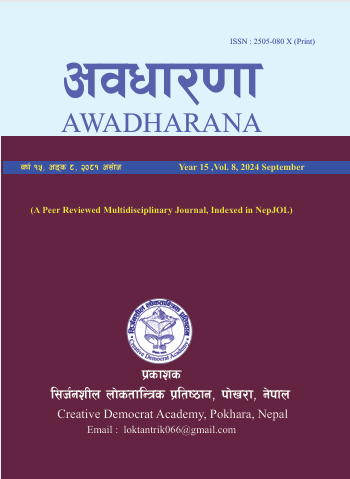Inherent Evil Nature in Golding’s Lord of the Flies: A Psychoanalytical Approach
DOI:
https://doi.org/10.3126/awadharana.v8i01.70096Keywords:
Barbarism, disorder, evil, innate, primitivism, savagery, unconsciousAbstract
This article analyzes William Golding’s novel, Lord of the Flies from the psychological perspective to explore the hidden intent of the characters. It is about a small group of children who divide and involve murdering each other from their peaceful beginning. Jack and his tribe of hunters including Roger are inclined to be guided by their unconscious and do many evil activities. The objective of this article is to explore how the characters in the novel are guided by unconscious and become savage. Ralph, Piggy, and Simon are guided by reasoning as they can control their unconscious and are not guided by evil as much as the groups of Jack do. Evil is not confined to any group or person, it is found everywhere within all even in Piggy and Ralph. If it is not controlled by our subconscious, the evil will take disastrous form. It applies a qualitative method of study to explore the unconscious activities of the characters and how they reflect evil activities rather than good activities. Studying the novel from the lens of psychoanalysis, it is found that human nature is inclined to exercise wild and instinctual drives than rational and logical activities.
Downloads
Downloads
Published
How to Cite
Issue
Section
License
Copyright (c) 2024 Creative Democrat Academy

This work is licensed under a Creative Commons Attribution-NonCommercial 4.0 International License.




